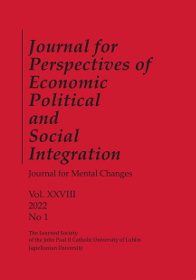Professional Preferences in the Ethnic and Economic Context of Poland and Turkey
Abstract
The main objective of the study is to assess the relationship between the system of student values in the multicultural aspect in relation to professional preferences. For this purpose, Polish and Turkish students were analyzed. The groups were further separated into those studying in the faculties of science and humanities. The social learning theory of Bandura serves as the foundation for the study of occupational preferences (Strelau, 2003). The research includes John Holland’s Theory of Career Choice (RIASEC) (Holland, 1970a, as cited in O’Shea & Harrington, 1972), Schwartz’s theory of basic values and its structure (Schwartz, 2012). Students’ values are expected to be directly related to their choice of studies based on the assumptions of Holland’s Theory of Career Choice (RIASEC) (O’Shea & Harrington, 1972). Also, the research by Berring et al. (2015), Sababa and Benson (2010), and the author’s interviews with the respondents are used to support the hypothesis that the Turkish students’ group has greater preferences for choosing science than the Polish students’ group.
References
Aycan, Z., & Fikret-Paşa, S. (2003). Career Choices, Job Selection Criteria, and Leadership Preferences in a Transitional Nation: The Case of Turkey. Journal of Career Development, 30(2), 129–144.
Berberoğlu, B., Omay, R. E., Berberoğlu, C. N., & Karaduman, Ç. (2017). The effects of Turkey’s level of socioeconomic development on the open education system. Educational Sciences: Theory & Practice,17, 1675–1698.
Berring, L., Kumari, S., & Ahuja, S. (2015). Personal values, gender differences and academic preferences: An experimental investigation. International Journal of Applied Psychology, 5(5), 133–140.
Bruce, D., & Quartey, F. (2017). Motivation for occupational preference among students of Regional Maritime University in Nungua, Accra- Ghana. International Journal of Research – Granthaalayah, 5(8), 158–174. https://doi.org/10.29121/granthaalayah.v5.i8.2017.2203
Cieciuch, J. (2011). Integration of Schwartz’s value theory and Scheler’s concept of value in research on the development of the structure of values during adolescence. Polish Psychological Bulletin, 42(4), 205–214. https://doi.org/10.2478/v10059-011-0027-5
Cieciuch, J. (2013). Pomiar wartości w zmodyfikowanym modelu Shaloma Schwartza. Social Psychological Bulletin, 8(1), 22–41.
Cieciuch, J., & Schwartz, S. H. (2018). Pomiar wartości w kołowym modelu Schwartza. In H. Gasiul (Ed.), Metody badania emocji i motywacji (pp. 307–334). Difin.
Demirutku, K., & Sümer, N. (2010). Temel Değerlerin Ölçümü: Portre Değerler Anketinin Türkçe Uyarlaması. Türk Psikoloji Yazıları, 13(25), 17–25.
Górniak, J. (2011). Studenci – przyszłe kadry polskiej gospodarki. Retrieved May 19, 2022 from https://portal.uw.edu.pl/documents/5800711/70e4f9e4–622e–4e68–882b–f694d9f07225
Gottfredson, G. D., Jones, E. M., & Holland, J. l. (1993). Personality and vocational interests: The relation of Holland’s six interest dimensions to five robust dimensions of personality. Journal of Counseling Psychology, 40(4), 518–524.
Juneja, A., & Rikhi, M. (2017). Influence of family environment and work values on vocational preference across career stages in young adults. IOSR Journal of Humanities and Social Science (IOSR–JHSS), 22(10), 82–91. https://orcid.org/0000-0002-1573-3771
Krzyminiewska, G. (2021). Work and its transformations: From statism-based work to the Gig Economy. Ekonomia i Prawo. Economics and Law, 20(3), 573–585. https://doi.org/10.12775/EiP.2021.034
O’Shea, A. J., & Harrington, Jr., T. F. (1972). Strong Vocational Interest Blank and Kuder Occupational Interest Survey differences reexamined in terms of Holland’s vocational theory. Journal of Counseling Psychology, 19(5), 455–460. https://doi.org/10.1037/h0033115
Paszkowska-Rogacz, A. (2011). Młodzieżowy Kwestionariusz Zainteresowań Zawodowych – MŁOKOZZ. Fundacja Realizacji Programów Społecznych.
Sababa , L., & Benson, L. (2010). The influence of personal values on career choice amongst public administration students of Adamawa State University, Mubi: Implications for counselling and human development, The Nigerian Academic Forum, 19(1).
Schwartz, S. H. (2012). An overview of the Schwartz Theory of Basic Values. Online Readings in Psychology and Culture, 2(1). https://doi.org/10.9707/2307-0919.1116
Strelau, J. (2003). Psychologia: podręcznik akademicki. Podstawy psychologii (Vol. 1). Gdańskie Wydawnictwo Psychologiczne.
Copyright (c) 2022 Journal for Perspectives of Economic Political and Social Integration

This work is licensed under a Creative Commons Attribution-NonCommercial-NoDerivatives 4.0 International License.

